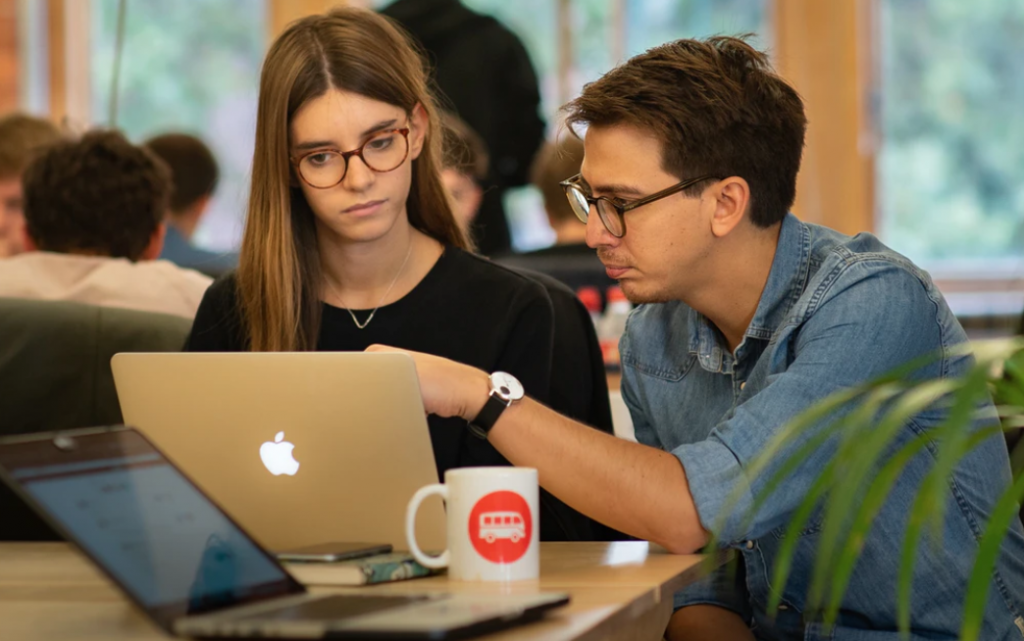Shortcuts – jump straight to
Excited, energized, some nerves
Students are teachers, too
Personal experience in feedback
Real-world examples
Imperfection
Being our genuine selves
Become a (better) UX writer
Let’s learn together.
Those words are at the heart of my journal entries about mentoring. They’re genuine. As I advanced in my mentorship journey with UX Writing Hub’s UX Writing Academy, I grew to understand learning is a collective experience. Those who teach gain lessons, too.
I was approached to be a mentor in November 2020. I had never done anything like this. Throughout most of the previous year, I enjoyed holding video calls about UX writing with curious and ambitious people throughout the world I met online.
But this invitation represented something different. A chance to offer inspiration. An opportunity to be inspired.
That’s what happened. I mentored two students. I gave feedback on their assignments. We also held 1-on-1 meetings about their work and the industry.
Whenever something from the experience inspired me, I wrote a brief LinkedIn post about my feelings. In those words, I see personal discovery. I witnessed an awakening.
If you can, become a mentor of some kind. Give back. Be vulnerable. Discover yourself.
Here are the journal entries from my mentorship journey:
Excited, energized, some nerves
After the past few days, I feel all those things. I started mentoring for the UX Writing Hub course this week. I have two students, and I’ll provide feedback on their assignments. We’ll also have career chats throughout the coming months.
As they explore a life change, I see pieces of myself in them. I admire their bravery to try something new. I respect their ambition to create a fresh path for themselves.
Reading their backgrounds made me think about my transition. When I started my UX writing job, I didn’t know what I didn’t know, which was great.
I learned on the fly. I made mistakes. But I kept going and did the work with a healthy attitude.
If we’re honest, that’s the secret to most things we want to achieve in life.
When I entered the field, I was so lucky to have a patient, thoughtful mentor as my manager. I hope I’ll be something similar for my students. I’m eager to gain fresh energy from them, too.
Upward!
Students are teachers, too
“This is a two-way street.”
Earlier this week, I held my first video call with a student. Before signing off, I shared the thought above. I was sincere about it.
Often, we think about lessons in the mentor-mentee relationship flowing from one direction. The mentor offers advice. The mentee applies tips to their future assignments.
But what if there’s an opening to think about this differently? 🤔
Of course, I feel a responsibility to offer thoughtful feedback whenever I can. But I want to learn from my students, too.
In our call, I could tell there was room for me to gain a renewed perspective. I can move beyond my little world. I can gain lessons from how someone views my craft during their first impression.
If you’re a student, know you’re a teacher as well.
Personal experience in feedback
When giving students feedback, I’ve written something like this: “In my own work…”
This has happened quite a bit recently. Often, I draw from lessons I’ve gained in recent years.
I hope this approach is helpful. When I think of my time as a student, the most memorable lessons came from people who made the feedback “real.”
For me, the best example of this came in college.
As a journalism student, I learned from professors who were writers or editors in previous career stops. I was particularly close with one.
I spent so many evenings with him. Near a back entrance to the newsroom, we chatted about writing, life. He shared stories as thin smoke from his cigarettes lingered into the air.
I remember sights and smells from those conversations. The memories are poignant, powerful.
I don’t smoke, and our online world limits the senses. But I hope some of what I share will remain impactful.
***
Real-world examples
“Hope this is a helpful tip.”
I began my message that way in Slack. Earlier this week, I provided screenshots from my company’s app in my feedback for my students’ assignments. I wanted to share that strategy with our mentor group.
“I think I’ll try,” I wrote, “to do something similar moving forward when the situation allows.”
I’m not sure there’s a right way to be a mentor. If you’re supportive and responsive, you’re on a path to success.
Still, I want to elevate my feedback and present real-world examples when I can.
I’ve written here about how, as a student, I valued mentors who made feedback “real.” I try to keep that in mind when communicating with my students. I hope including screenshots from my work environment will benefit them in a deeper way.
Would you find this helpful? Do you have other ideas for how to share real-world experience in assignment feedback?
***
Imperfection
I’m not perfect. Like my students, I’m learning throughout this journey. And that’s awesome! 🙌
Yesterday, I had a thoughtful email exchange with a student. After I sent feedback for one of her assignments, she explained she withheld some details in her copy for a financial alert because of security concerns.
“I like the extra-layer thinking,” I wrote back.
This made me pause.
When writing my feedback, security didn’t cross my mind. But she made a great point. I’m glad she opened my eyes to that angle of the assignment.
For me, this experience was a good reminder that no feedback is foolproof. We’re imperfect humans doing imperfect things. Givers can have good intentions. But in reality, we’re all growing in our respective roles.
If we lift one another, we can make collective progress.
Being our genuine selves
I opened the email. The message made me smile. 😊
“Seems like students really love what you do,” part of the note read.
Recently, I received feedback about my mentorship. I didn’t enter this experience to earn compliments. Above all, I wanted to help and share the knowledge I’ve gained since joining the field.
But I’m human. The positive words felt good.
There’s a lesson here.
While mentoring, I’ve been my whole self. I give honest opinions. I try to be an empathetic sounding board. I attempt to empower and enlighten with my words. I know I haven’t been perfect.
This is a new experience for me. It might have been easy to be someone I’m not. It’s great to know my students have enjoyed working with me. The real me. The full me.
Even in unfamiliar situations, we should be our genuine selves. Don’t overthink what we can offer the world. That’s a lesson I’ll take from this journey, no matter where I go.
Become a (better) UX writer
Join the UX Writing Academy course and learn with a dedicated mentor.
Andrew Astleford is an Atlanta-based UX content strategist. Connect with him on LinkedIn, or email him at aastleford[at]gmail.com.



